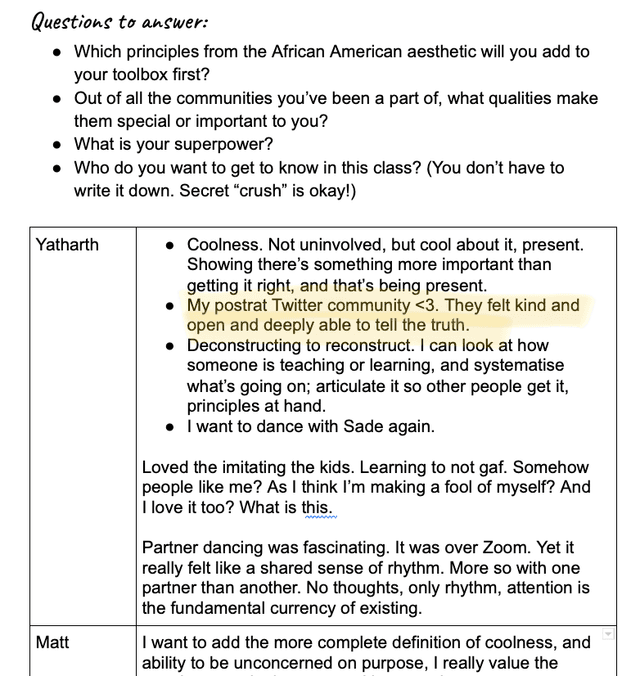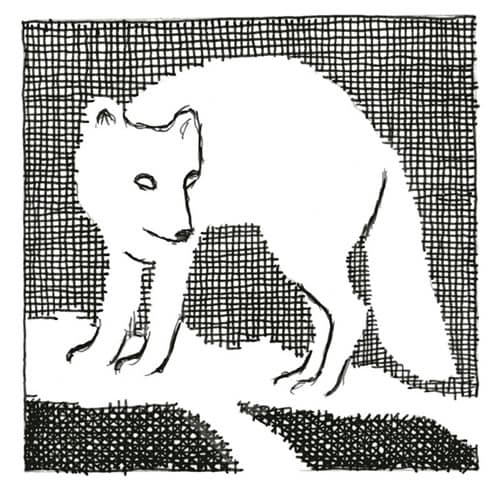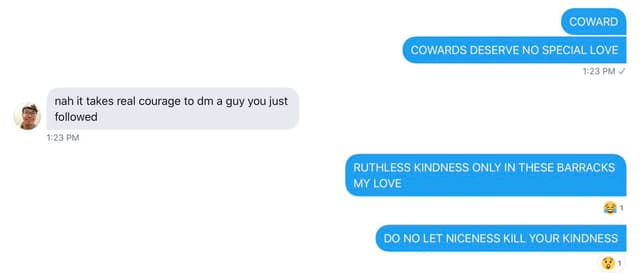🧵 View Thread
🧵 Thread (12 tweets)

Someday I’ll look back and say, “I grew up here” . . just as 12yo me grew up on IRC channels in open source communities. https://t.co/m3yPEjmiIj

Those IRC channels felt kind. There were mentors, yet no one treated me less than an adult. This place has that. https://t.co/zUxrVb9dS2

So: What makes a community feel kind that way [to me]? Martial arts dojos have it too. Recognition of different skill levels, for sure, yet no one lesser than. A respect at the bottom, a noblesse oblige at the top. Rivalrous, without rivalry. https://t.co/rAQcPI1y4Y https://t.co/QpditOhByk
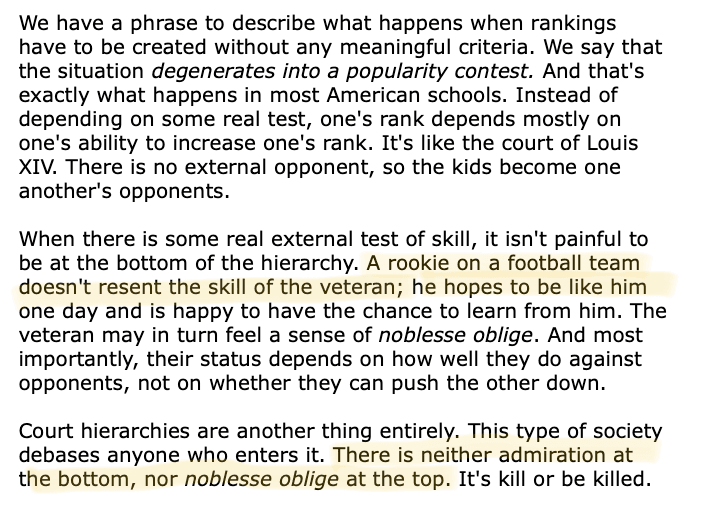

Paul Graham posits it’s because there’s something 𝘮𝘦𝘢𝘯𝘪𝘯𝘨𝘧𝘶𝘭 being honed, whether open source (IRC channels), martial arts (in case of dojos), or being less confused about the world (here). They had something real to work on.

I’ve noticed this at Stanford too. The best, kindest, most robust clubs form around something real, whether it’s external debate competitions or building balloons to fly to space. There’s skill, mentorship, camraderie, socialisation.

Dojos literally have explicit belts. You get punched in the face if you’re sorted wrong. They’re not afraid of inequality. Tantra isn’t either. It could tell me the blindlingly obvious truth, 𝘸𝘦’𝘳𝘦 𝘯𝘰𝘵 𝘦𝘲𝘶𝘢𝘭, while maintaining the emptiness of that too. https://t.co/5yAjUudFX3
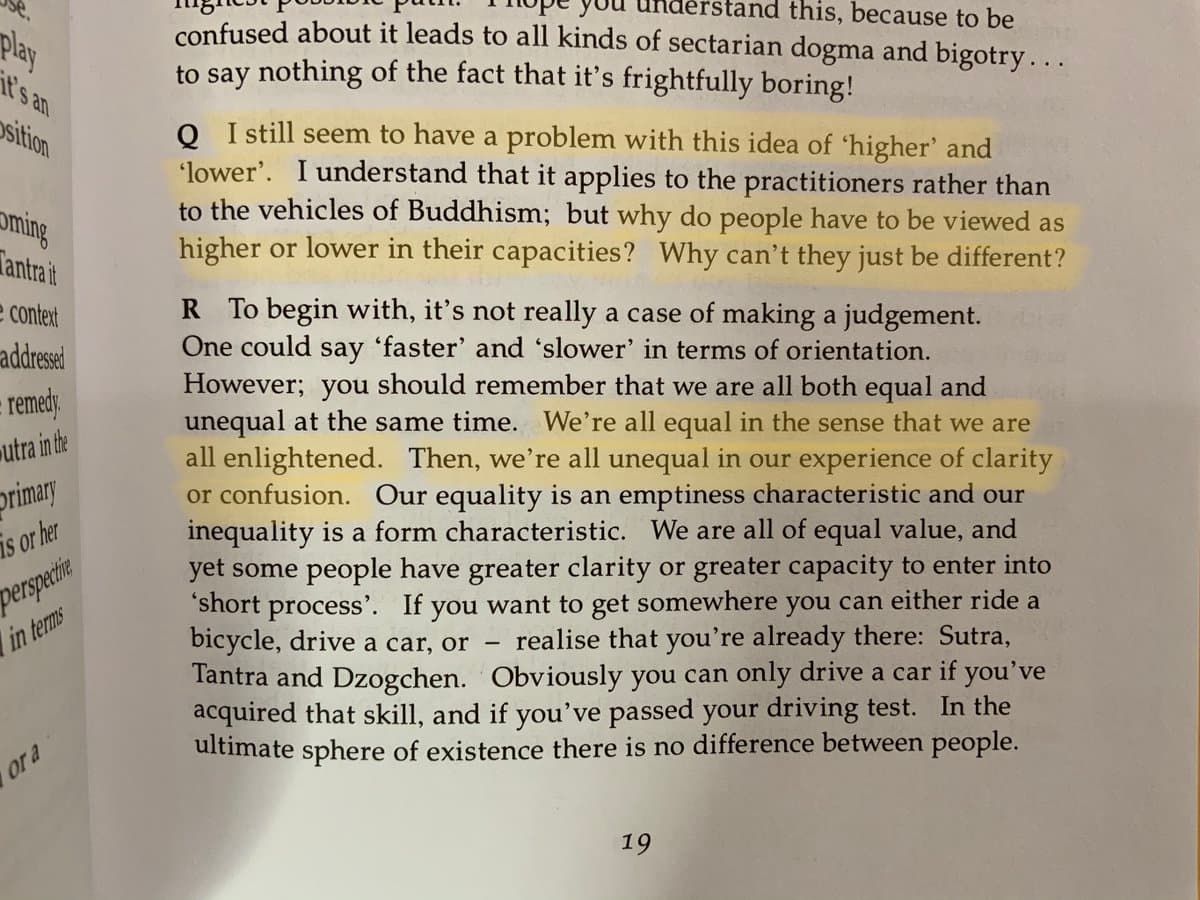

I trusted these communities to trust me with the truth. I didn’t always others. Most adults felt like they wanted to pass me safety wheels & safety ideologies. https://t.co/z4dEdMGI6z

Kind ≠ nice. @visakanv made this point to me, and he’s someone who builds that trust, that he will fuck around and tell you what’s up, not always, and not naïvely, but he has more of the skill to say it, and more respect for you to take it. https://t.co/QvFqAyJoSV

So to review: What made these communities feel kind? - Comfort with inequality. - Recognition of difference without disrespect. - Telling the truth without tightness. - Equipping their members for something about the world.

This is all based on my trauma, naturally. You can tell what I’m afraid of. I’m not afraid of being at the bottom. I’m afraid of not being told the truth. I’m not afraid of being cringe. I’m deeply afraid of being cringe and not knowing it.

@AskYatharth mm I think I used to struggle with this too, and it was Victor Wooten’s approach to music that helped me untangle quite a bit of it: If you make music with your cringe it’s not cringe anymore https://t.co/rUPeqeqmtQ

while reading Alan Watts and thinking about my own stuff, it suddenly occurred in me that once you learn to delight in your mistakes – to find the pleasure in being wrong – you will experience incredible, abundant joy far greater than anything typically advertised as possible

Kind ≠ nice. @visakanv made this point to me, and he’s someone who builds that trust, that he will fuck around and tell you what’s up, not always, and not naïvely, but he has more of the skill to say it, and more respect for you to take it. https://t.co/QvFqAyJoSV

So to review: What made these communities feel kind? - Comfort with inequality. - Recognition of difference without disrespect. - Telling the truth without tightness. - Equipping their members for something about the world.

This is all based on my trauma, naturally. You can tell what I’m afraid of. I’m not afraid of being at the bottom. I’m afraid of not being told the truth. I’m not afraid of being cringe. I’m deeply afraid of being cringe and not knowing it.

@AskYatharth mm I think I used to struggle with this too, and it was Victor Wooten’s approach to music that helped me untangle quite a bit of it: If you make music with your cringe it’s not cringe anymore https://t.co/rUPeqeqmtQ

while reading Alan Watts and thinking about my own stuff, it suddenly occurred in me that once you learn to delight in your mistakes – to find the pleasure in being wrong – you will experience incredible, abundant joy far greater than anything typically advertised as possible

I trusted these communities to trust me with the truth. I didn’t always others. Most adults felt like they wanted to pass me safety wheels & safety ideologies. https://t.co/z4dEdMGI6z

Kind ≠ nice. @visakanv made this point to me, and he’s someone who builds that trust, that he will fuck around and tell you what’s up, not always, and not naïvely, but he has more of the skill to say it, and more respect for you to take it. https://t.co/QvFqAyJoSV

So to review: What made these communities feel kind? - Comfort with inequality. - Recognition of difference without disrespect. - Telling the truth without tightness. - Equipping their members for something about the world.

This is all based on my trauma, naturally. You can tell what I’m afraid of. I’m not afraid of being at the bottom. I’m afraid of not being told the truth. I’m not afraid of being cringe. I’m deeply afraid of being cringe and not knowing it.

@AskYatharth mm I think I used to struggle with this too, and it was Victor Wooten’s approach to music that helped me untangle quite a bit of it: If you make music with your cringe it’s not cringe anymore https://t.co/rUPeqeqmtQ

while reading Alan Watts and thinking about my own stuff, it suddenly occurred in me that once you learn to delight in your mistakes – to find the pleasure in being wrong – you will experience incredible, abundant joy far greater than anything typically advertised as possible

Kind ≠ nice. @visakanv made this point to me, and he’s someone who builds that trust, that he will fuck around and tell you what’s up, not always, and not naïvely, but he has more of the skill to say it, and more respect for you to take it. https://t.co/QvFqAyJoSV

So to review: What made these communities feel kind? - Comfort with inequality. - Recognition of difference without disrespect. - Telling the truth without tightness. - Equipping their members for something about the world.

This is all based on my trauma, naturally. You can tell what I’m afraid of. I’m not afraid of being at the bottom. I’m afraid of not being told the truth. I’m not afraid of being cringe. I’m deeply afraid of being cringe and not knowing it.

@AskYatharth mm I think I used to struggle with this too, and it was Victor Wooten’s approach to music that helped me untangle quite a bit of it: If you make music with your cringe it’s not cringe anymore https://t.co/rUPeqeqmtQ

while reading Alan Watts and thinking about my own stuff, it suddenly occurred in me that once you learn to delight in your mistakes – to find the pleasure in being wrong – you will experience incredible, abundant joy far greater than anything typically advertised as possible

Those IRC channels felt kind. There were mentors, yet no one treated me less than an adult. This place has that. https://t.co/zUxrVb9dS2

So: What makes a community feel kind that way [to me]? Martial arts dojos have it too. Recognition of different skill levels, for sure, yet no one lesser than. A respect at the bottom, a noblesse oblige at the top. Rivalrous, without rivalry. https://t.co/rAQcPI1y4Y https://t.co/QpditOhByk


Paul Graham posits it’s because there’s something 𝘮𝘦𝘢𝘯𝘪𝘯𝘨𝘧𝘶𝘭 being honed, whether open source (IRC channels), martial arts (in case of dojos), or being less confused about the world (here). They had something real to work on.

I’ve noticed this at Stanford too. The best, kindest, most robust clubs form around something real, whether it’s external debate competitions or building balloons to fly to space. There’s skill, mentorship, camraderie, socialisation.

Dojos literally have explicit belts. You get punched in the face if you’re sorted wrong. They’re not afraid of inequality. Tantra isn’t either. It could tell me the blindlingly obvious truth, 𝘸𝘦’𝘳𝘦 𝘯𝘰𝘵 𝘦𝘲𝘶𝘢𝘭, while maintaining the emptiness of that too. https://t.co/5yAjUudFX3


I trusted these communities to trust me with the truth. I didn’t always others. Most adults felt like they wanted to pass me safety wheels & safety ideologies. https://t.co/z4dEdMGI6z

Kind ≠ nice. @visakanv made this point to me, and he’s someone who builds that trust, that he will fuck around and tell you what’s up, not always, and not naïvely, but he has more of the skill to say it, and more respect for you to take it. https://t.co/QvFqAyJoSV

So to review: What made these communities feel kind? - Comfort with inequality. - Recognition of difference without disrespect. - Telling the truth without tightness. - Equipping their members for something about the world.

This is all based on my trauma, naturally. You can tell what I’m afraid of. I’m not afraid of being at the bottom. I’m afraid of not being told the truth. I’m not afraid of being cringe. I’m deeply afraid of being cringe and not knowing it.

@AskYatharth mm I think I used to struggle with this too, and it was Victor Wooten’s approach to music that helped me untangle quite a bit of it: If you make music with your cringe it’s not cringe anymore https://t.co/rUPeqeqmtQ

while reading Alan Watts and thinking about my own stuff, it suddenly occurred in me that once you learn to delight in your mistakes – to find the pleasure in being wrong – you will experience incredible, abundant joy far greater than anything typically advertised as possible

Kind ≠ nice. @visakanv made this point to me, and he’s someone who builds that trust, that he will fuck around and tell you what’s up, not always, and not naïvely, but he has more of the skill to say it, and more respect for you to take it. https://t.co/QvFqAyJoSV

So to review: What made these communities feel kind? - Comfort with inequality. - Recognition of difference without disrespect. - Telling the truth without tightness. - Equipping their members for something about the world.

This is all based on my trauma, naturally. You can tell what I’m afraid of. I’m not afraid of being at the bottom. I’m afraid of not being told the truth. I’m not afraid of being cringe. I’m deeply afraid of being cringe and not knowing it.

@AskYatharth mm I think I used to struggle with this too, and it was Victor Wooten’s approach to music that helped me untangle quite a bit of it: If you make music with your cringe it’s not cringe anymore https://t.co/rUPeqeqmtQ

while reading Alan Watts and thinking about my own stuff, it suddenly occurred in me that once you learn to delight in your mistakes – to find the pleasure in being wrong – you will experience incredible, abundant joy far greater than anything typically advertised as possible

I trusted these communities to trust me with the truth. I didn’t always others. Most adults felt like they wanted to pass me safety wheels & safety ideologies. https://t.co/z4dEdMGI6z

Kind ≠ nice. @visakanv made this point to me, and he’s someone who builds that trust, that he will fuck around and tell you what’s up, not always, and not naïvely, but he has more of the skill to say it, and more respect for you to take it. https://t.co/QvFqAyJoSV

So to review: What made these communities feel kind? - Comfort with inequality. - Recognition of difference without disrespect. - Telling the truth without tightness. - Equipping their members for something about the world.

This is all based on my trauma, naturally. You can tell what I’m afraid of. I’m not afraid of being at the bottom. I’m afraid of not being told the truth. I’m not afraid of being cringe. I’m deeply afraid of being cringe and not knowing it.

@AskYatharth mm I think I used to struggle with this too, and it was Victor Wooten’s approach to music that helped me untangle quite a bit of it: If you make music with your cringe it’s not cringe anymore https://t.co/rUPeqeqmtQ

while reading Alan Watts and thinking about my own stuff, it suddenly occurred in me that once you learn to delight in your mistakes – to find the pleasure in being wrong – you will experience incredible, abundant joy far greater than anything typically advertised as possible

Kind ≠ nice. @visakanv made this point to me, and he’s someone who builds that trust, that he will fuck around and tell you what’s up, not always, and not naïvely, but he has more of the skill to say it, and more respect for you to take it. https://t.co/QvFqAyJoSV

So to review: What made these communities feel kind? - Comfort with inequality. - Recognition of difference without disrespect. - Telling the truth without tightness. - Equipping their members for something about the world.

This is all based on my trauma, naturally. You can tell what I’m afraid of. I’m not afraid of being at the bottom. I’m afraid of not being told the truth. I’m not afraid of being cringe. I’m deeply afraid of being cringe and not knowing it.

@AskYatharth mm I think I used to struggle with this too, and it was Victor Wooten’s approach to music that helped me untangle quite a bit of it: If you make music with your cringe it’s not cringe anymore https://t.co/rUPeqeqmtQ

while reading Alan Watts and thinking about my own stuff, it suddenly occurred in me that once you learn to delight in your mistakes – to find the pleasure in being wrong – you will experience incredible, abundant joy far greater than anything typically advertised as possible
